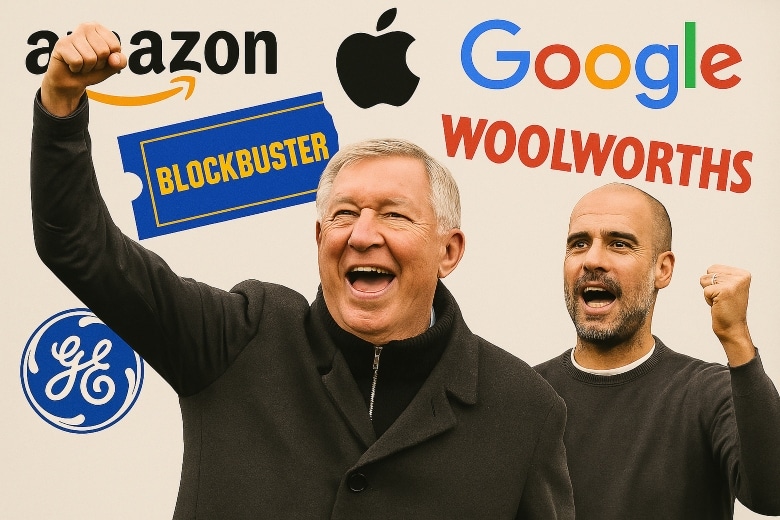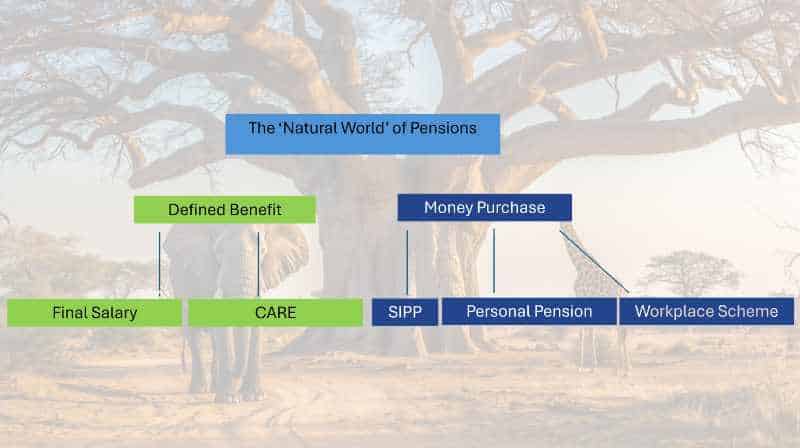
When planning your financial future, especially in retirement, it’s easy to fall into the trap of trying to pick winners. You might hear about a hot stock or a booming sector and think it’s a shortcut to retirement.” Today it’s the Magnificent 7 of Apple, Alphabet, Amazon, Google, Meta, Tesla & Nvidia, or gold, or Bitcoin. But trying to pick individual shares that will outperform in the long term is a bit like betting your life savings on one football club’s continued success.
The history of the Premier League is a helpful metaphor.
The Rise and Fall of Giants
Think back to the 1990s. If you had to pick one football club to dominate for decades, Manchester United would have been the obvious choice. Under Sir Alex Ferguson, they were not just winners, they were a dynasty. If the Premier League were a stock market, United would have been the equivalent of Apple; one of the best in the world, a consistent performer with a strong brand, deep pockets and a global fanbase.
But fast-forward to the present, the story is very different, and as a United fan, very painful. Since Fergie’s retirement in 2013, United have burned through managers, underperformed on the pitch, wasted £ billions and struggled to keep up with their fiercest rivals. Despite continued commercial success, their footballing dominance is but a memory of halcyon days.
Meanwhile, Manchester City, their city rivals, became the new standard-setters. With strategic investment, world-class recruitment and a clear vision, they’ve become one of the most consistent clubs in Europe. Worse still for a Utd fan, Liverpool too, after decades in the wilderness, returned to the top under Jürgen Klopp, winning both the Premier League and Champions League in recent years and subsequently with Arne Slot.
This shift in power mirrors what happens in the stock market. The companies leading the market today may not be tomorrow’s success stories. Think of firms like Nokia, Kodak or even Tesco. All were once top picks in their industries, but competitive pressure, technology shifts or poor management saw their fortunes decline.
The Relegation Risk
In the early 1990s, when the Premier League was launched, its founding clubs included the likes of Oldham Athletic, Coventry City, Wimbledon, and Sheffield Wednesday. These clubs were part of the top flight and, at the time, many had rich histories and strong fan bases.
Today, several of them are no longer in the Premier League; some are even in League One or League Two, the third and fourth tiers of English football. Wigan, Swindon, Luton and Blackpool are teams who enjoyed Premier League football, but no find themselves playing Exeter City in League One. Oldham Athletic, for instance, were relegated from the Football League altogether in 2022 are back into League Two. Wimbledon no longer exists in its original form, having become MK Dons, while a phoenix club, AFC Wimbledon, started from scratch and climbed the leagues to League One.
Imagine investing heavily in one of these clubs at the start of the Premier League era, believing they’d stay successful. It would have been a painful, and expensive, ride.
In the same way, individual companies can fall out of favour. Technological changes, poor decisions or bad luck can send a once-profitable company tumbling. Think of once popular brands like Blockbuster, Thomas Cook & Woolworths, if your retirement savings were tied up in that one business, you’d feel the full impact.
The Unexpected Success Stories
While some traditional giants have faltered, new success stories have emerged. Clubs like Brighton & Hove Albion, Brentford and Bournemouth have shown what clever management, long-term planning and a strong identity can achieve. All have climbed from the lower divisions to become Premier League regulars. Brighton even qualified for European competition in 2023.
These clubs didn’t exist in the Premier League landscape 20 years ago. But like small companies with a sound strategy and strong management, they’ve punched above their weight, delivered impressive results and grown to stable businesses. For corporate equivalents think of Betfair, Starling Bank & ASOS.
It’s tempting to think you could spot these winners early, but that’s easier said than done. For every Brighton, there are dozens of clubs (and companies) that never quite make it.
Why Diversification Wins
If the Premier League were a stock market, owning just Manchester United or even Manchester City would be a risky strategy. You’d be putting all your faith in one club, hoping they’d continue to succeed over decades.
But owning the entire Premier League or even all 92 clubs in the Football League, would mean you’d benefit from whoever rises to the top. When United decline, you’d still own a share of City. When Brentford surprise everyone, you’d gain from their rise too.
This is exactly how investing in a diversified fund works. Rather than picking individual stocks, you spread your money across hundreds or even thousands of companies, worldwide. Some will fall, others will rise, but overall, the market tends to grow over time.
What This Means for Your Retirement Planning
As you approach or enjoy retirement, the implications of poor investment decisions are greater. You may not have time to recover from mistakes. That’s why long-term success depends on sensible planning, not following the herd.
Instead of trying to pick the next star performer, focus on broad exposure. Low-cost index funds, diversified portfolios and regular reviews are far more reliable than chasing headlines or tips. A well-structured investment plan should work whether a handful of companies are successful or not.
In the meantime, I will hope that Ruben Amorim takes United, Apple like, to the pinnacle of world football while Liverpool and Manchester City suffer a similar fate to great companies like GE and ICI.
In a similar theme:
Winning Comes In Phases. Why It Pays You To Assume It Won’t Last Forever.
Using The Football World Cup & A Betting Exchange To Explain Stock Markets
Using the Premier League to Explain Stock Markets
From T-Rex to Microsoft – What The Theory of Evolution Can Teach Us About Investing






